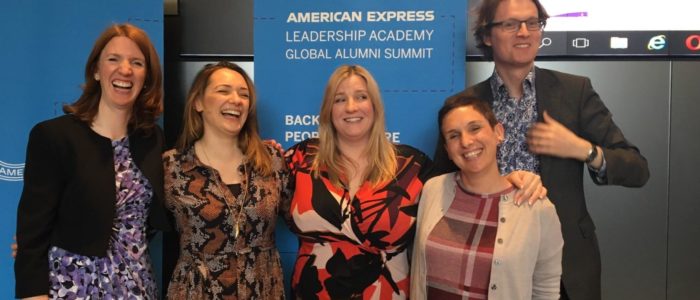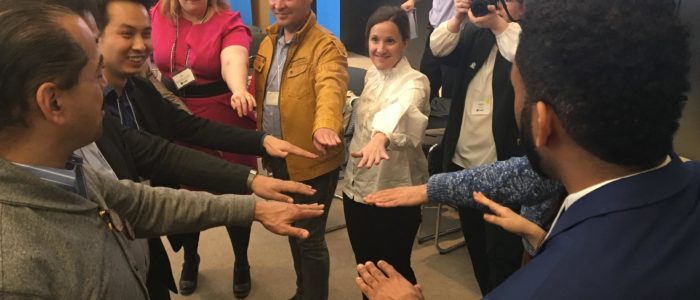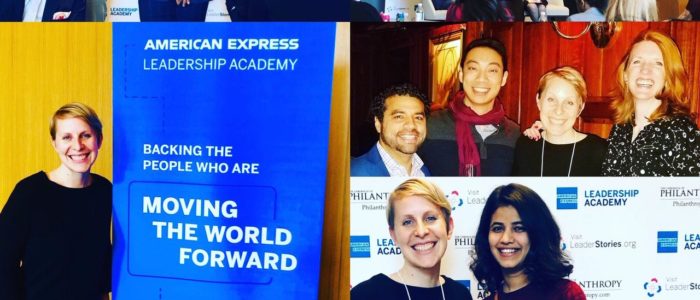
We live in a time characterized by an accelerating rate of change and increasing interdependence of systems, making the world around us more complex than ever. Understanding this complexity is especially relevant when trying to solve social problems that are rooted in history, have a strong present context and are intertwined with the forces shaping our future. How can leaders equip themselves to be effective in this context?
This question inspired the theme for the fifth annual American Express Leadership Academy Global Alumni Summit, Engaging All: Strategies for Thriving in Complexity. Each year, the Summit brings together alum from the American Express Leadership Academy and partner programs for two days of leadership development, community building and knowledge sharing.
The activities, workshops and panel sessions were designed for the participants by the participants, and focused on helping “for purpose” leaders build the mindset and skills needed to engage diverse stakeholders in a meaningful and impactful way and to thrive in this complexity.
The Summit kicked off with a community building and networking dinner led by an alumna. Alumni and Academy partners started to get to know each other through ice-breakers. These activities helped attendees let go of their inhibitions and the dinner ended with a “rock paper scissors” championship where everyone cheered on one another.
The tone for the Summit was set from the first organized moment: a visit to the National Museum of African American History and Culture in Washington, DC. The Museum beautifully showcases movements and strategies of how leaders engaged with diverse stakeholders in demanding equal rights for African American people and brought change. While moving through the exhibit, one could see how community members of the disenfranchised came together to spread awareness across crosscutting issues and audiences, even in the face of great peril.
New Rules for New Times
The summit included a special livestream conversation between Bill Drayton, founder and CEO of Ashoka, and Stacy Palmer, editor of The Chronicle of Philanthropy. The conversation centered on Bill’s journey as the founder of the world’s largest network of social entrepreneurs and his insights on engaging all. Bill emphasized that the old rule of leadership—“writing rules for others to follow”—is no longer effective. We need new rules, where leaders invite more people to lead the change, where a leader’s role is to enable such a space. To do so, leaders need to have cognitive empathy of good for all. Only when leaders have this capacity, will they be able to apply it to the complex task of forming teams of diverse stakeholders for achieving a larger common purpose.
This highly inspiring day culminated with a dinner where new friendships were forged and old connections were celebrated.
Participants heard from two of American Express’ board members, Ambassador Charlene Barshefsky, a former Trade Representative for the United States, and Ted Leonsis, founder and chairman of Monumental Sports & Entertainment.
Charlene shared ten questions that all leaders should ask themselves:
- Who are you?
- What are your values?
- How do you manage people?
- Do you set a clear direction for the organization so everyone can follow it?
- Are you an effective communicator?
- Do you motivate and empower people?
- Are you focused on your mission, but are you flexible?
- How do you measure success?
- Do you focus on what matters?
- Do you inspire people?
Ted shared that if you are happy, you have a high probability of being successful – organizations, boards and companies want to be around people who are self-actualized and are on a mission. Here’s Ted’s happiness formula:
- Be an active participant in multiple communities of interest;
- Have high levels of personal expression;
- Have high levels of personal empathy;
- Find the higher calling in everything that you are doing.
Tapping the Power of People: Open Space Technology and Reciprocity Circles
For me, some of the most notable takeaways from my first Summit were the conversations with fellow alum. The most important part of this network of support is the people. I found myself wondering, how can I tap into the wisdom and resources of this network?
Andres Marquez-Lara, an Academy Alum and founder of the Promethean Communities, designed and facilitated two workshops to help me answer this: Open Space Technology and the Reciprocity Circle. These are effective tools in engaging diverse stakeholders in finding real solutions and also fit well within the Summit theme.
The Open Space Technology concept was invented by Harrison Owen in 1985 to involve participants in creating their own meeting agenda while facilitators lead and record the discussions. At the Summit, 12 participants got a chance to ask their burning questions/challenges and crowdsource solutions from their peers. These solutions were rooted in personal experience and practicality.
The Reciprocity Circle is a dynamic group exercise that applies the “pay-it-forward” principle to the group while creating and cementing high-quality connections. This session provided an opportunity for everyone to ask for help (both personal and professional) and receive it in real time. It focuses on five-minute favors: we all sat in a circle and shared some of our challenges, and then shared what we could offer to someone else that requires little effort on our end but might have a significant impact on the other person.

Not only did these two sessions have immediate, tangible outcomes but they also gave participants an opportunity to learn this approach and take new tools back to our organizations.
Although the Summit has ended, I’m still feeling the energy, inspiration and learning. Explore LeaderStories to continue to be inspired by social purpose leaders making a difference around the world.

This article is also posted on the LeaderStories website today, April 30, 2019




